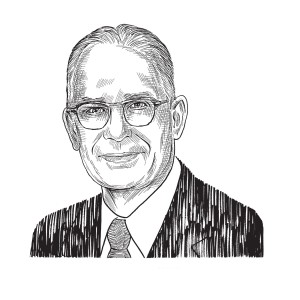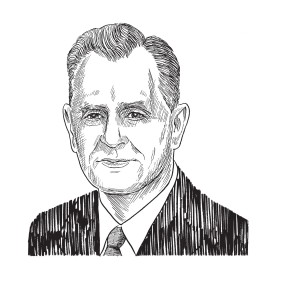TUSCALOOSA, Ala. — Four renowned communication and information leaders will be inducted into The University of Alabama College of Communication and Information Sciences Hall of Fame Thursday, Oct. 8.
The induction ceremonies will be at the NorthRiver Yacht Club.
Established by the College’s Board of Visitors, the Communication Hall of Fame was created in 1998 to honor, preserve and perpetuate the names and accomplishments of civic and communication personalities who have brought lasting fame to the state of Alabama. This year’s honored individuals include:
▪ Winston F. Groom Jr.
▪ Norma Saliba Hanson
▪ Raymond D. Hurlbert
▪ S. Vincent Townsend Sr.
The Communication Hall of Fame Gallery is located in the rotunda of Reese Phifer Hall on the UA campus. Permanent archives will be established and maintained for the collection of memorabilia related to the lives and careers of those chosen for placement in the Hall of Fame.
2009 College of Communication and Information Sciences Hall of Fame Inductees
Winston F. Groom Jr.

Winston Groom attended The University of Alabama and, while studying literature and writing for campus publications such as the Rammer-Jammer, decided to become a writer. First, however, he served in Vietnam in the U.S. Army during 1966 and 1967. After his discharge, Groom became a journalist, working as a reporter and columnist for the Washington Star, and then in 1976, with the encouragement of Willie Morris and other literary friends, he became a full-time writer of novels.
Much of Groom’s work has to do, in whole or in part, with Vietnam and the military. He and Duncan Spenser published the nonfiction “Conversations with the Enemy,” the story of Pfc. Robert Garwood. The book was nominated for the Pulitzer Prize.
It was, however, the hugely entertaining and satiric novel “Forrest Gump” and the enormously successful 1994 movie based on the novel that made Groom, and Gump, household names. The character Gump has been deemed “iconic” and, as odd as that might seem, it is so. A writer’s importance may be measured in many different ways, such as critical opinion and sales figures, but perhaps more significant even than the way the writer uses the English language is the number of striking phrases the writer puts into the English language. “Gump” is full of them, from the opening line, “Let me say this: bein’ a idiot is no box of chocolates” to the poignant refrain, “I got to pee.”
Groom has written 15 books and in the latest phase of his career has applied his novelist’s skills in characterization, scenic presentation and engrossing storytelling to the creation of narrative history.
Norma Saliba Hanson

Norma Hanson credits her father, Joseph Saliba Sr., for shaping her work ethic and her values. “He considered having a job a gift,” Hanson says. As she was headed from her hometown of Dothan to The University of Alabama, her father gave her the following advice: “No one there is any better than you are, and no one there is beneath you . . . so look everyone in the eye and treat everyone the same.”
After graduation in 1957, Hanson took her values and her energy into her chosen field of marketing and advertising, and the results, over a career of more than 50 years, have been amazing. Hanson went to work for Tucker Wayne & Co. in Atlanta in 1980, worked for Design Associates as a consultant, and then became the co-founder of Slaughter-Hanson in Dothan and Birmingham, working as lead account manager on many important national accounts.
From 1993 to 2005 Hanson was an independent consultant in business development, advertising and marketing. In 2005, she founded her present agency, Norma Hanson & Associates, in Dothan, where she remains involved with the community as a member of the board of directors of the Dothan Chamber of Commerce and a corporate supporter of the Dothan Service League.
Hanson has been recognized by her professional peers with the American Advertising Federation Silver Medal Award and the Southeast Advertising Federation’s Advertising Pioneer Award, in 2004. Adweek magazine chose her as one of “Six Women to Watch” in 1988, and she was selected as one of the “Women Who Mean Business” by Business Alabama in 1991.
Hanson’s alma mater has honored her as a member of XXXI, a women’s leadership honorary, and an Outstanding Alumna Award from the College of Communication and Information Sciences.
Raymond D. Hurlbert (1902 – 1996)

Raymond Hurlbert, born in Pittsburgh, Penn., grew up in Birmingham and spent his professional life in the service of education and communication – in many spheres – dedicated to his beloved Alabama.
Hurlbert earned bachelor’s and master’s degrees from Birmingham-Southern College. In 1924 he began his education career as a teacher, and he was promoted within two years to principal in the Birmingham city schools. From the beginning, Hurlbert, as an educator, was a natural communicator. He was rapidly recognized as a leader, elected president of the Birmingham Teachers Association, the Alabama Principals Association and was appointed public relations director for the city board of education.
In 1948 he was elected president of the Alabama Education Association. His energetic efforts as AEA president to provide quality education throughout Alabama culminated in his being tapped in 1953 by Gov. Gordon Persons as the first president of the Alabama Educational Television Commission. He became AETC general manager in 1955. For 20 years he was the driving force in building the first, and ultimately largest, educational television network in the nation. Under his direction, operating solely on funds provided by the Alabama legislature, the Alabama ETV system became an international prototype, hosting broadcasters and educators from Britain to Burma.
Hurlbert has been recognized as the “father of Alabama ETV.” He was elected chairman of the board of the National Association of Educational Broadcasters for 1962-63, and he was president of the National Association of Educational Television in 1968. His participation in legislative hearings on behalf of the Public Broadcasting Act was recognized as key testimony in passage of the legislation, and he was honored by President Lyndon Johnson for his efforts on behalf of what would become national public broadcasting.
An avid Rotarian with 48 years of perfect attendance, Hurlbert became known for personally establishing 27 new Rotary clubs in Alabama, and he was recognized in the district as “Mr. Rotary.” He was a charter member of the USS Alabama Battleship Commission, one of those responsible for fund-raising and direction, bringing the ship home to Alabama shores.
Always an educator, ever a communicator, Hurlbert was largely responsible for the present scope, excellence and success of Alabama Public Television today. In many ways, Alabama Public Television is his legacy.
S. Vincent Townsend Sr. (1901 – 1978)

Vincent Townsend, former Birmingham News executive editor and assistant to the publisher, was a journalist during some of the most newsworthy years of the last century, in one of the most newsworthy cities. During the turbulent years of the civil rights movement, Townsend worked tirelessly behind the scenes to promote better interracial relations and was in touch with city, state and national figures, who consulted him for advice.
Jesse Lewis Sr., who founded the Birmingham Times in 1964 to better serve the city’s black community, recalled, in a 2009 interview, getting to know Townsend in the 1960s: “He guided me along the way during the Civil Rights struggle. He was a central figure behind the formation of the Downtown Action Committee, and he was responsible for going to the merchants and telling them they had to let black people drink out of the fountains, use the bathrooms, ride the elevators and try on clothes. During the heat of the [Civil Rights] movement, we often talked two or three times a day. He was not the type of person that did anything openly, for recognition or publicity, he just did it out of the goodness of his heart.”
Townsend’s part in Birmingham history has been noted in works about the civil rights movement, including Diane McWhorter’s “Carry Me Home,” David Garrow’s “Bearing the Cross” and Glenn Eskew’s “But for Birmingham.” In 1969 Townsend guided the founding of the biracial Community Affairs Committee of Operation New Birmingham. He was one of nine men featured in a 1971 Ebony magazine article about Operation New Birmingham titled “White Voices of the South.” A 1976 article in Time magazine stated that Townsend “had the ear” of the city’s business leaders and “persuaded them to meet with the city’s black leaders for what he called ‘self-preservation.’”
A 1925 graduate of Birmingham-Southern College, Townsend was recognized in 1965 with the Distinguished Alumni Award; in that same year he was named Birmingham’s Citizen of the Year, and in 1984 the Alabama Press Association added him to its Hall of Honor.
Contact
Deidre Stalnaker, 205/348-6416, dstalnaker@ur.ua.edu
Source
Neely Portera, UA College of Communication and Information Sciences, 205/348-5868